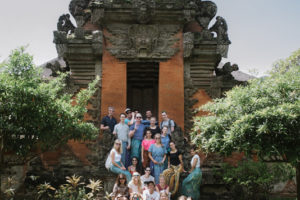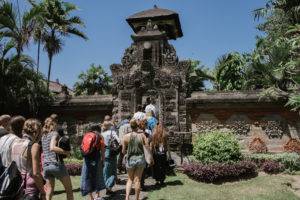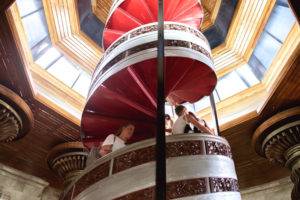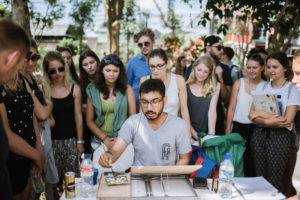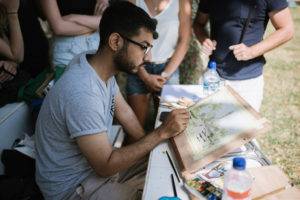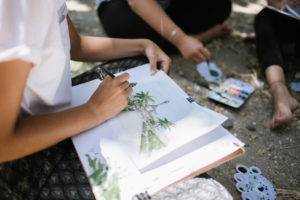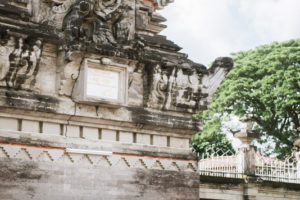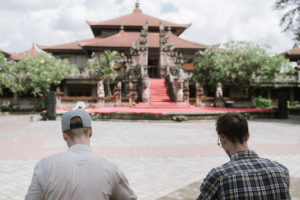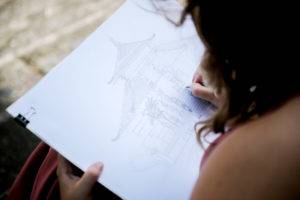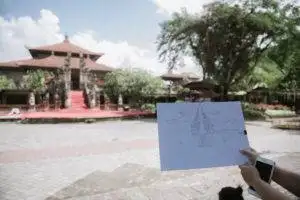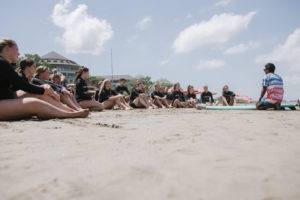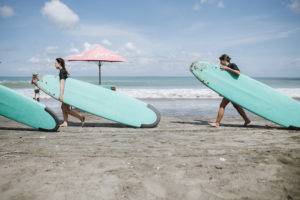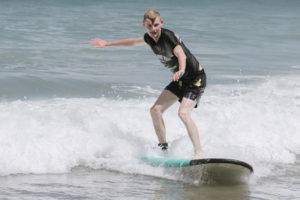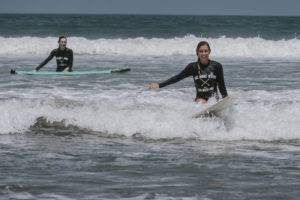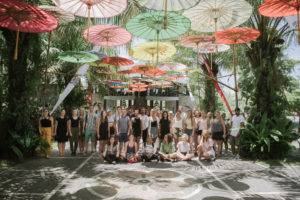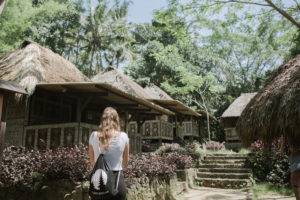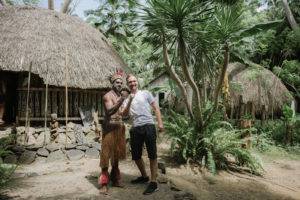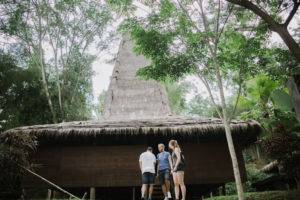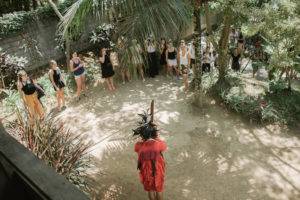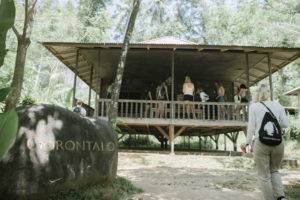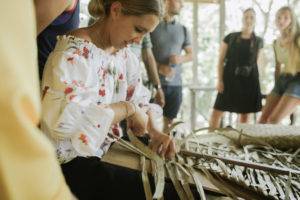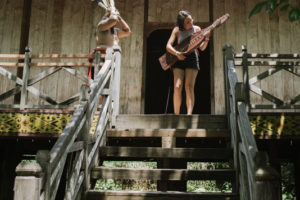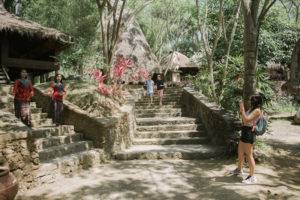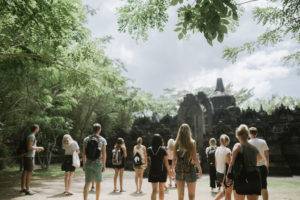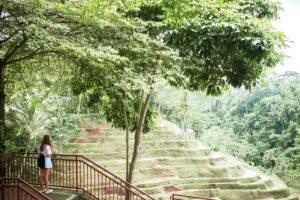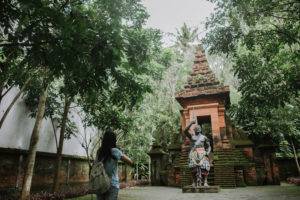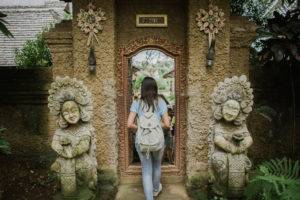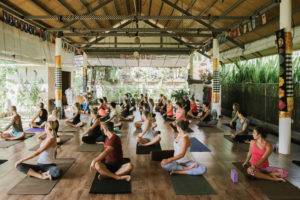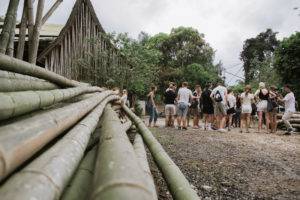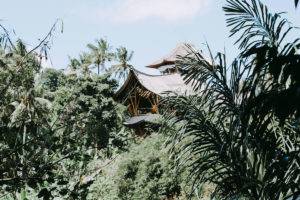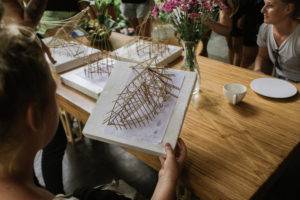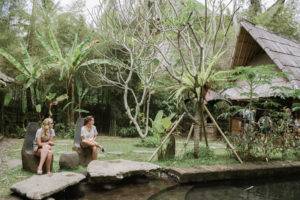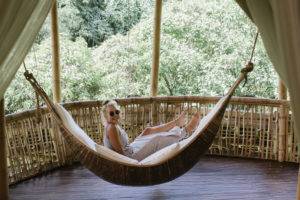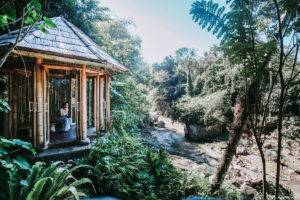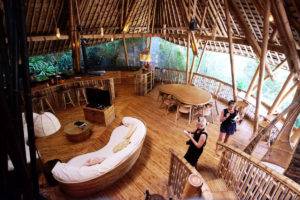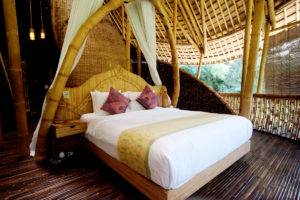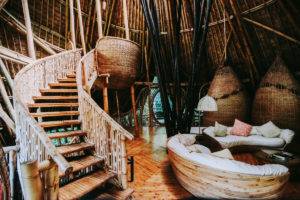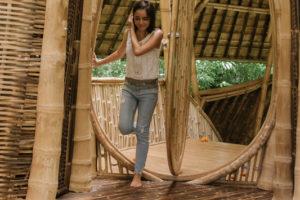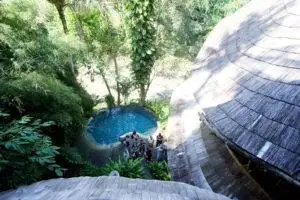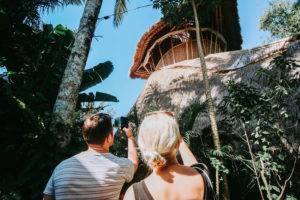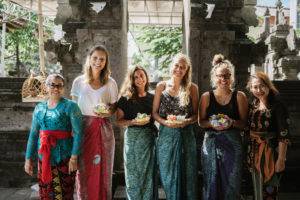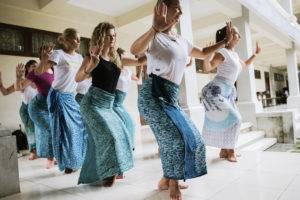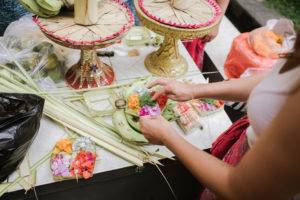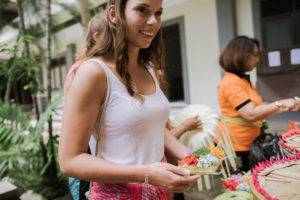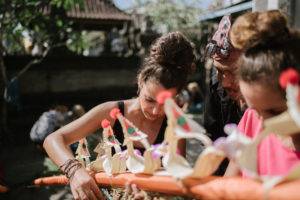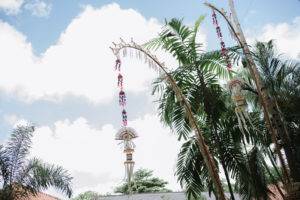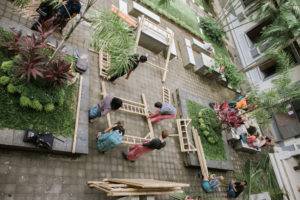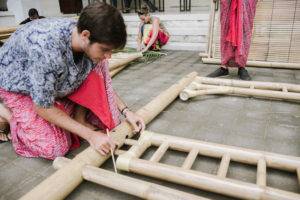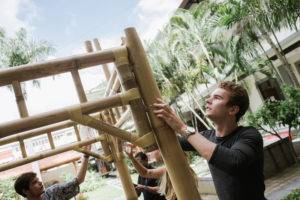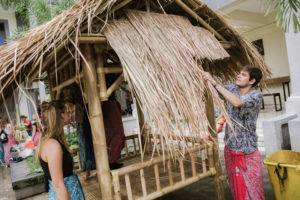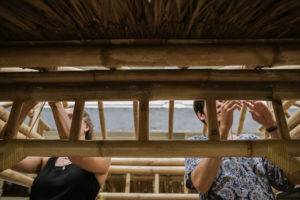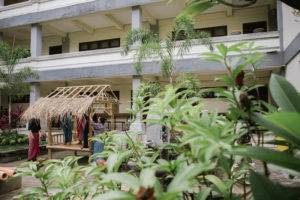The tropical environment of the “Island Paradise” Bali as well as the strong international orientation of Udayana University attract hundreds of students annually and make Bali a unique place to study abroad.
Universitas Udayana
15 Weeks
This fifteen-week program combines English lectures and guest presentations, weekly excursions and workshops, leisure activities, and cultural events.
6 Subjects
Six modules lend insight to the unique culture of Southeast Asia and the tropics, from traditional layout principles, indoor and outdoor living, green design, and luxurious hotel architecture.
30 Credit Points
You can receive up to 30 ECTS credits within the Southeast Asian Architecture program. The ECTS credits are transferable to other credit systems such as the US credit system.
Semester Abroad
Southeast Asian Architecture
Are you looking for inspiration? Discover the unique building culture of Southeast Asia and the tropics, from simple Balinese dwellings to exotic villa and luxurious beach resorts. This fifteen-week program at the Udayana University in Bali, Southeast Asian Architecture, is geared towards exchange and international students. Through its lectures, excursions, and workshops, it demonstrates how traditional forms, natural materials, and western approaches work together in harmony. The goal of this course is to forge a comparison between western and tropical building styles and to use innovative connections to initiate new styles of harmony in modern architecture. Apart from practical work for blueprint projects, theoretical courses in English will be carried out in the university. These mainly involve the fields of interior architecture, hotel architecture, and the building history of Southeast Asia. Given numerous intensive excursions and workshops, you will learn about the architecture of Southeast Asia and Tropical Living in Bali.
Southeast Asian Architecture
General
How is the course organized?
- Lectures in English
- Excursions
- Workshops
- Language course in “Bahasa Indonesia”
- Selected cultural events
Who can participate?
- Architecture
- Interior design
- Design
- Landscape architecture
- Related subject areas
Master students and graduates are also invited to participate.
Why study in Bali?
- receive detailed knowledge about construction in the Tropics
- experience Tropical Living in Bali through workshops and excursions
- earn up to 30 credit points
- meet students from around the world
- gain valuable insights into the cultural diversity of Indonesia
Southeast Asian Architecture
Dates
Summer Class 2024
01.04.2024 – 19.07.2024
Application deadline 15.12.2023
Welcoming Dinner: 30.03.2024
Orientation Day: 01.04.2024
Classes: 01.04.2024 – 12.07.2024
Graduation: TBA
Winter Class 2024
02.09.2024 – 20.12.2024
Application deadline: 15.06.2024
Welcoming Dinner: 31.08.2024
Orientation Day: 02.09.2024
Classes: 02.09.2024 – 13.12.2024
Graduation: TBA
Southeast Asian Architecture
Fees
$ 2,200
tuition fee for the entire semester course
(15 weeks)
Including
Lectures and guest lectures in English
Excursions & workshops
Assistance with application and preparation
Enrolment & administration
Southeast Asian Architecture
Subjects

Subjects
- SEA Vernacular Architecture (5 ECTS)
- Resort & Hospitality Design (5 ECTS)
- Interior Architecture (5 ECTS)
- Tropical Home (5 ECTS)
- Studio Project (8 ECTS)
- Indonesian Language (2 ECTS)

SEA Vernacular Architecture
Traditional Architecture in Southeast Asia is an endless source of tropical building styles, interior architecture, landscape architecture, and art. Within the geographical context, the building culture is research-based, and revolves around socio-cultural and cosmological aspects of design, as well as architectonic principles and their history. (5 CP)

Resort & Hospitality Design
Bali is one of the most coveted tourist destinations in the world, home to uniquely-positioned top hotels and exclusive resorts. Beginning with tourism development, many types of resorts present their blueprints, inspirations, concepts, and programming, and these resorts have researched general trends and aspects of Eco and Green design. (5 CP)

Interior Architecture
In this course, new harmonies of interior design are integrated and developed with an intercultural approach. Comparisons between “Eastern” and “Western” interior architecture are drawn. This course concerns building construction, interior living concepts, furniture design, tropical materials, and decorative influences in the modern style. (5 CP)

Tropical Home
The “Tropical Home” course concerns architectural and landscape planning in the Tropical climate. This course also deals with exotic housing designs schemas for villas, houses, and apartments. In this course, you will study the ongoing interaction between climate, culture, traditions, lifestyle, and design in the Tropics, as well as the influence of international trends on unique new living concepts. (5 CP)

Studio Project
The studio project merges the foundations of the four topic fields: “SEA Vernacular Architecture,” “Resort & Hospitality Design,” “Interior Architecture,” and “Tropical Home” in a design exercise. The connections between tropical and western layout principles blend new harmonies to be developed in modern architectural concepts. (8 CP)

Bahasa Indonesia
The Indonesian language (Bahasa Indonesia) is the national language of Indonesia. The language connects the inhabitants of the country, which counts around 500 individual languages and dialects in the different regions. Students will learn basics and helpful sentences, which are useful for every day situations. (5 CP)
Southeast Asian Architecture
Excursions & Workshops
Denpasar City Tour
Outdoor Sketching & Watercolor Workshop with Urban Sketchers Bali
Surfing Lesson at Bali Green Surf School
Visit to Taman Nusa Cultural Park & Penglipuran, Traditional Balinese Village
Yoga Class at Pranava Yoga Bali
Bamboo Tour & Model Making at Green Village Bali
Ceremonial Workshop
Southeast Asian Architecture
Application
Preparation
You can apply online, using our online registration form. Have your proof of student status, CV, letter of motivation as well as a high-resolution picture of yours handy.
Fill in the registration form
Fill in the online registration form and upload all required documents. Within 1-3 working days you will receive an email from us with your registration confirmation.
Confirm Application
Sign the registration confirmation and send it back to us. Your registration is now complete and you will receive all further information regarding study fees, visa, accommodation, etc.
Southeast Asian Architecture
FAQ
Udayana University
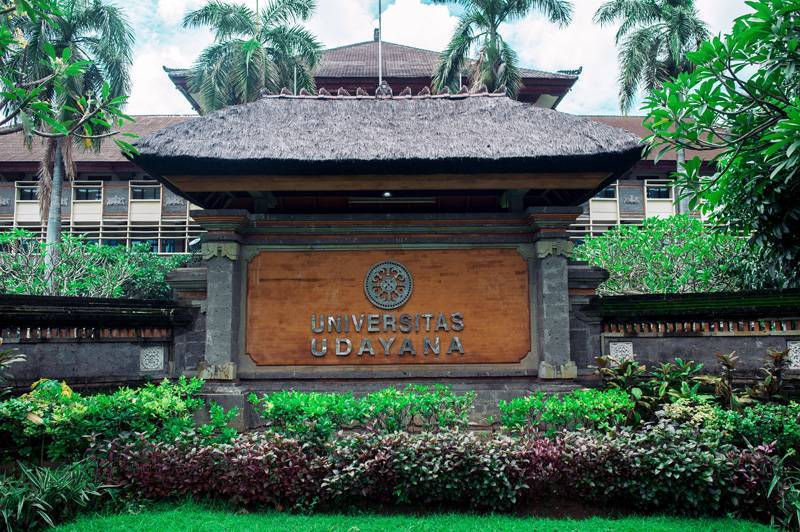
UNIVERSITAS UDAYANA
Udayana as a government university is recognized by the Ministry of Education and Culture as well as the International Association of Universities (IAU). Worldwide partner Universities and international orientation attract hundreds of students annually. The amazing tropical environment in Bali, the excellent network and the international orientation make Udayana Univerity a unique place to study abroad.
The main campus of Udayana is located in Bali’s capital of Denpasar. More than 1,600 lecturers teach at a total of 9 faculties: architecture and engineering, law, medicine, veterinary medicine, economics, agronomy, literature, mathematics, social and political sciences. This made Udayana University one of the top 10 Universities in Indonesia.
Entitled by the Indonesian Ministry of Education, the Udayana University offers bachelor’s, master’s and doctoral degrees.
Requirements for Participation
- Minimum age of 18 years (you must be at least 18 years old at the time of application)
- High School diploma or similar qualification at the upper secondary level
- Enrollment at a university in a corresponding subject area or a degree certificate is required (at least 2 completed semesters)
- No proof of English language skills or an official language test (e.g. TOEFL) is required. However, all applicants are expected to have a good command of English, to follow lessons and to take exams in English.
All programs are open to bachelor and master students as well as graduates.
You can also participate if
- you study at a university of applied sciences, private university, polytechnic college, evening school, or adult education center.
- you already have a university degree or are about to finish your studies.
- you have already completed an exchange semester or a semester abroad.
- your current university does not have a partnership with the university in Bali. The programs are free mover programs and can be organized autonomously, independent of exchange or cooperation contracts of your own university.
- you would like to register in pairs or as a group.
Registration and Enrolment Procedure
Before Registration
Prior to registering for our program, please follow these steps:
- Thoroughly Explore the Program Page:
Take the time to familiarize yourself with the details provided on our program page. - Download and Review Course Description and Terms of Conditions:
Download and carefully read our Course Description and the Terms of Condition to understand the program’s requirements and expectations. - Check with Your University for Credit Transfer:
If necessary, consult your university to confirm if they accept semesters abroad as free movers and whether the credits earned during your time abroad can be applied to your degree program. You can also discuss the possibility of signing a Learning Agreement between your university and Universitas Udayana.
The Application Process
When applying, please complete the following steps and submit the required documents:
- Letter of Motivation:
Your letter of motivation should be concise, not exceeding one page (DIN A4 format). Describe your motivation for applying for a semester abroad in Bali, your expectations for the program, and how this experience will contribute to your personal and academic development. - Certificate of Enrollment:
Submit an official document from your university confirming your current enrollment as a student. Graduates can provide proof of their degree, such as a bachelor’s or master’s diploma. If you are not currently enrolled or come from a different field of study but wish to participate in our programs, please contact us in advance. - Photo:
Upload a high-quality portrait photo of yourself. This photo will also be used for your Student Book and Student ID if your enrollment is successful. Ensure that your photo is clear and well-lit, without excessive darkness or pixelation. - Curriculum Vitae (CV):
Provide your most recent CV, ideally not exceeding one page (DIN A4 format). You can find an example here.
Registration Confirmation and Tuition Fees
Upon completing your registration, you will receive a confirmation email within 1-3 working days. Please sign and return the registration confirmation using our digital signature system.
Once we receive the signed registration confirmation, you will receive a checklist for planning your semester and a list of enrollment documents required for the university.
If we have reached the minimum requirement of 10 participants, you will also receive a payment request for the course fees. The course fee consists of an Enrollment Fee and a Tuition Fee. The Enrollment Fee, a one-time charge confirming your enrollment, is due within 30 days of receiving the invoice. The Tuition Fee must be paid at least 8 weeks before the program start date.
If the minimum participant requirement has not been met, we will collect all registrations and send payment requests once the minimum number is reached.
Enrollment, Visa Documents, and Semester Start
Upon receipt of your full tuition fee and enrollment documents, we will apply for the Letter of Acceptance (LoA) and the Sponsor Letter/Invitation Letter (LoI) at Universitas Udayana. These documents are essential for your visa application.
Approximately 4 weeks before the semester begins, you will receive an email containing details about the Welcome Event & Orientation Day, the Time Table, Academic Calendar, Study Guide, and more.
Structure and Course of the program
The 15-week programs at Universitas Udayana are designed exclusively as semesters abroad for international students. All courses are held in English. As this is an international program, the curriculum and academic calendar are independent of the local Bachelor‘s and Master‘s programs.
The course duration is 15 weeks, divided into 11 weeks of effective course, 2 weeks semester break, 1 week final exam, and 1 week revision.
- Welcome Dinner
Before the semester starts officially, we organize a Welcome Dinner for all participants of StudyInBali. The dinner will take place in a relaxed atmosphere on the Saturday before the start of the semester. Here you will have the opportunity to get to know each other and exchange initial information. Participation is not compulsory. - Orientation Day
The Orientation Day will take place on the first Monday in the first week of study at the Sudirman campus in Denpasar, unless otherwise stated. On Orientation Day you will get all the important information about the study program and living on Bali. You will also get to know your course coordinators and sign up for the courses you want to take. - Lectures & Excursions
The lectures usually take place from Monday through Wednesday mornings, Thursdays are days for excursions & workshops. Excursions & workshops are part of the curriculum and included in the workload of each module. - Semester Break
During the 15-week program, there is a two-week semester break where no lectures, excursions, or other events are held. The semester break usually takes place in weeks 8 & 9. Detailed information comes at the beginning of the semester. - Final Examinations
During the week of the final exams, the performance of all modules will be assessed in writing, orally, or in the form of a submission. You will receive the results at the latest at the graduation. - Graduation
Graduation is the last official event at Universitas Udayana. It usually takes place 1.5 weeks after the final exams. Here you will receive your certificates.
Certificates
At the end of the program, students who satisfactorily complete all course requirements will be awarded certificates as follows:
- A Certificate stating that the student has attended the program.
- An Academic Transcript showing the student’s performance in the program. The grades in the transcript are the final marks.
- A Certificate stating that the student has participated in workshops and academic excursions (on request).
Credit Points
All programs are designed to comply with the European Credit Transfer System (ECTS). This system is based on workload, measured in hours and includes lectures, exams, self-study, research, subject-related excursions, etc. One semester corresponds to 30 ECTS credits. ECTS enables the measurement, comparison, and transfer of academic achievements between universities. If the semester is completed successfully, the credits achieved can be credited with the help of ECTS. So you can return to your home university without any loss of time or credit points. The ECTS system is transferable to other credit systems such as the US credit system and similar systems.
If you want to have the subjects credited at your home university, we suggest having the course pre-approved by the home institution’s exchange coordinator, academic advisor, or a professor; whoever is in charge of credit transfer and sign a “Learning Agreement”, in order to provide a transparent and efficient preparation of the study period abroad and to ensure that you will receive recognition for the educational components successfully completed abroad.
Course Selection
All modules listed in the program description are offered every semester. It is not necessary to register for certain modules before the start of the course. It is up to you to decide which of the offered modules you want to take.
Can I combine modules of different programs?
Unfortunately, it is not possible to combine modules of different programs, because the lectures of all programs run parallel. In particular, there would be overlaps in the timetable of excursions and workshops which are adapted to the modules.
What happens if I don‘t pass a course?
If you do not pass a course, you will not get a grade or credit points for the module.
Visa
Visa Options for International Students
Indonesia offers various types of visas for different purposes. However, for international students planning to enroll at Universitas Udayana, the Visit Visa B211A stands as the recommended choice. It’s crucial to understand that this visa is one of only two types designated for educational purposes. Please note that studying in Indonesia on a Visa on Arrival, or any other non-study-specific visa, is not permitted.
The Role of Local Sponsors in Your eVisa Application
A key part of the eVisa application process involves securing a local sponsor. For those choosing to study at Universitas Udayana, the university itself will serve as your local sponsor. Moreover, the entire application procedure will be coordinated and managed by Universitas Udayana’s Visa Agency, simplifying the process for you.
The Integrated Visa Application and Enrollment Process
The visa application process is closely tied to your enrollment at Universitas Udayana. Once you have successfully submitted all the required documents for registration and enrollment, the university will generate both a Letter of Acceptance and a Sponsor Letter for you. These documents are immediately forwarded to the designated Visa Agency. You don’t need to initiate the visa application independently; the Visa Agency will proactively contact you following successful registration and enrollment. All further formalities, including payment procedures and other related matters, will be coordinated directly between you and the Visa Agency, making the entire process streamlined and hassle-free.
Here’s a summary of the information you need to know about the B211A visa:
- Type of Visa: Visit Stay Index of Visa: B211A
- Purpose of Visit: Training and Short Course
- Validity of Visa: 90 days from the date of issue (number of days you have to enter the country after visa has been issued)
- Stay: 60 days (from arrival date)
- Extendable: 2 times (each extension is for 60 days)
- Total Stay: 180 days, including 2 extensions
- Entry Permit: Single Entry (cannot be used after leaving the country)
- Sponsorship: By University, UNUD
- Price (as of October 2023,tentantive): IDR 6,000,000 (≈ $ 400) for 120) days; IDR 8,800,000 for 180 days
Transport
The traffic on Bali’s roads is impressive and very different to that found in Western countries. It can seem pretty chaotic in the beginning. Traffic jams are a part of everyday life. The traffic flows according to its own rules. Time, patience, and serenity are important at peak times in this respect. Many students choose to ride a scooter. It´s the fastest and easiest way to get around. They drive on the left side of the road, but one gets used to that relatively quickly.
An international driver’s license is mandatory. You can apply for one in your home country.
Accommodation
Accommodation is an important aspect to consider when planning your trip to Bali. To ensure a stress-free experience, we recommend making upfront reservations for accommodations with flexible cancellation policies and low non-refundable deposits.
Many of our participants prefer to stay together in groups and book a house or villa with a pool. To find roommates and exchange ideas, we encourage you to join our Facebook group.
When it comes to booking accommodation, it’s a matter of personal preference. Booking in advance can be a good option for those who want to have everything arranged before arriving in Bali. However, it’s also possible to search for accommodation on-site, which allows you to choose the best option for you and potentially save on agent fees. Keep in mind that on-site searches can be time-consuming and should be done at least 2 weeks prior to the start of the semester.
Additional Costs
The tuition fee for the 15-weeks program includes:
» Registration and enrollment
» Lectures at the Udayana University
» Workshops and Excursions
not included in the tuition fee:
» Flight and accommodation
» Visa Fees & Extension Fees
» Travel Health Insurance
» Transport
» Living costs
The cost of living is relatively low in Bali. However, it is difficult to say how much money you will need for the 15 weeks, as it strongly depends on the individual lifestyle.
Here you can find a list of general living costs.






